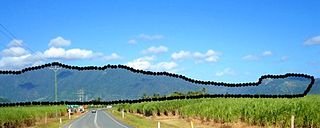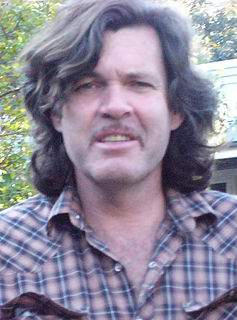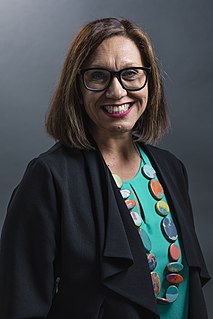Related Research Articles

Australian Aboriginal religion and mythology is the sacred spirituality represented in the stories performed by Aboriginal Australians within each of the language groups across Australia in their ceremonies. Aboriginal spirituality includes the Dreamtime, songlines, and Aboriginal oral literature.

Indigenous music of Australia comprises the music of the Aboriginal and Torres Strait Islander peoples of Australia, intersecting with their cultural and ceremonial observances, through the millennia of their individual and collective histories to the present day. The traditional forms include many aspects of performance and musical instrumentation that are unique to particular regions or Aboriginal Australian groups; and some elements of musical tradition are common or widespread through much of the Australian continent, and even beyond. The music of the Torres Strait Islanders is related to that of adjacent parts of New Guinea. Music is a vital part of Indigenous Australians' cultural maintenance.

Clinton Walker is an Australian writer, best known for his works on popular music but with a broader interest in social and cultural history and theory. Sydney's Sun-Herald has called him "our best chronicler of Australian grass-roots culture." Books he's published like Inner City Sound (1981), Buried Country (2000) and History is Made at Night (2012) have had a seminal impact on the Australian music scene. Similarly, while he found best-selling success as Bon Scott's biographer, Walker's non-music books like Football Life (1998) and Golden Miles (2005) have offered an appreciation of subjects hitherto hardly deemed worthy of serious consideration. More recently, in early 2018, he courted controversy when his book Deadly Woman Blues was withdrawn from sale to be pulped after only a couple of weeks on the shelves.
The Wave Hill walk-off, also known as the Gurindji strike, was a walk-off and strike by 200 Gurindji stockmen, house servants and their families, starting on 23 August 1966 and lasting for about nine years. It took place at Wave Hill, a cattle station in Kalkarindji, Northern Territory, Australia, and was led by Gurindji man Vincent Lingiari.
Australian Aboriginal English (AAE) is a dialect of Australian English used by a large section of the Indigenous Australian population. It is made up of a number of varieties which developed differently in different parts of Australia. These varieties are generally said to fit along a continuum ranging from light forms, close to Standard Australian English, to heavy forms, closer to Kriol. There are generally distinctive features of accent, grammar, words and meanings, as well as language use. AAE is not to be confused with Kriol, which is a separate language from English spoken by over 30,000 people in Australia. Speakers have been noted to tend to change between different forms of AAE depending on whom they are speaking to, e.g. striving to speak more like Australian English when speaking to a non-Indigenous English-speaking person.
The Deadly Awards, commonly known simply as The Deadlys, was an annual celebration of Australian Aboriginal and Torres Strait Islander achievement in music, sport, entertainment and community. The first Deadlys were held in 1995, at the Boomalli Aboriginal Artists Co-op in the Redfern suburb of Sydney. They stemmed from Boomalli's 1993 Deadly Sounds music and culture radio show, and were driven by Gavin Jones. Over the next few years, their venue shifted through The Metro Theatre, the Hard Rock Café, Home in Darling Harbour, Fox Studios and others. Then 2001 began The Deadlys residency at the Sydney Opera House, from where the annual gala was broadcast by National Indigenous Television.
Coloured Stone is an Aboriginal Australian band whose members originate from the Koonibba Mission, west of Ceduna, South Australia. The band performs using guitar, bass, drums, and Aboriginal instruments – didjeridu, bundawuthada and clap sticks – to play traditional music.
The Jawoyn, also written Djauan, are an Australian Aboriginal people living in the Northern Territory of Australia. The Bagala clan are of the Jawoyn people.
Bart Willoughby is an Indigenous Australian musician, noted for his pioneering fusion of reggae with Indigenous Australian musical influences, and for his contribution to growth of Indigenous music in Australia.
The Gurindji are an Aboriginal Australian people of northern Australia, 460 kilometres (290 mi) southwest of Katherine in the Northern Territory's Victoria River region.
The Wardaman people are a small group of Aboriginal Australians living about 145 kilometres (90 mi) South-West of Katherine, on Menngen Aboriginal Land Trust in the Northern Territory of Australia.

Anita Marianne Heiss is an Aboriginal Australian author, poet, cultural activist and social commentator. She is an advocate for Indigenous Australian literature and literacy, through her writing for adults and children and her membership of boards and committees.
Warren Hedley Williams is an Aboriginal singer, musician and songwriter from Hermannsburg in Central Australia. Williams is an Arrernte man who plays country music and works as a broadcaster on CAAMA Radio in Alice Springs He started playing guitar at six with his father Gus Williams.
North Tanami Band are a reggae/ska band from Lajamanu, a town located about 600 km to the north of Yuendumu. The members are Warlpiri and their songs are sung in Warlpiri and English. They were the subjects of the documentary The Traveling Warlpiris (1992).
Roger Knox is an Australian country singer, known as the Black Elvis and the Koori King of Country.
Kulumindini Band are an aboriginal rock band from Elliott, Northern Territory. They are named after a Jingili dreaming site. The members are Jingili-Mudbura people and they sing in both Mudbura and English. In 2008 they were inducted into the hall of fame at the NT Indigenous Music Awards.
Allan Moarywaalla Barker, known as Black Allan Barker, is a singer and songwriter from Port Hedland. He described his music as "Aboriginal grassroots blues" and is about Aboriginal oppression and rights. Barker was a co-founder of Greenpeace Australia. Barker only recorded one album, 1983's Fire Burning (Abmusic) which is now rare to find. "Black Al" was well known for his performing in Sydney's Central Station tunnel in 1991 where he sang in language whilst his son Alan Jr accompanied him on didgeridoo. Barker spent some time in Nimbin during the 1990s and was involved with local Aboriginal youth in cultural and musical pursuits.
Kuckles was an Australian band. They formed in 1981 by students from Broome, Western Australia studying at the Centre for Aboriginal Studies in Music in Adelaide. Their music moved from acoustic calypso toward an electric reggae/rock style.
South West Syndicate were an Australian hip-hop collective from Sydney. They started performing in 1992. and have been made up of Aboriginal, Lebanese-Australian, Pacific Islander, Croatian, German and Anglo hip hop artists. Core members include Munkimuk, Brothablack, Nasri Basal, Darren Stacey (Dax) with additional members Nadeena Dixon, Terrance Murphy,Kider, Ebony Williams, Danielle Tuwai, Mohammed Abdullah, Phil Pelia, Safwan Barbour and Fadi Chami.
Our Home, Our Land is a compilation album released in Australia by CAAMA in 1995. It was released to celebrate the victory in the Mabo case. It focused on the importance of land to the Aboriginal and Torres Strait Islander beliefs. It was nominated for a 1996 ARIA Award for Best Indigenous Release.
References
- ↑ Dunbar-Hall, Peter; Gibson, Chris (July 2004). Deadly Sounds, Deadly Places. Contemporary Aboriginal Music in Australia. University of New South Wales Press. ISBN 0-86840-622-8. ISBN 9780868406220.
- ↑ Breen, Marcus (1989). Our Place Our Music. Aboriginal Studies Press. ISBN 0-85575-197-5.
- ↑ Walker, Clinton (2000). Buried Country: The Story of Aboriginal Country Music. Pluto Press. ISBN 1-86403-152-2.
- ↑ Music Australia Ilkari Maru
- ↑ Music Australia Lightning Strikes